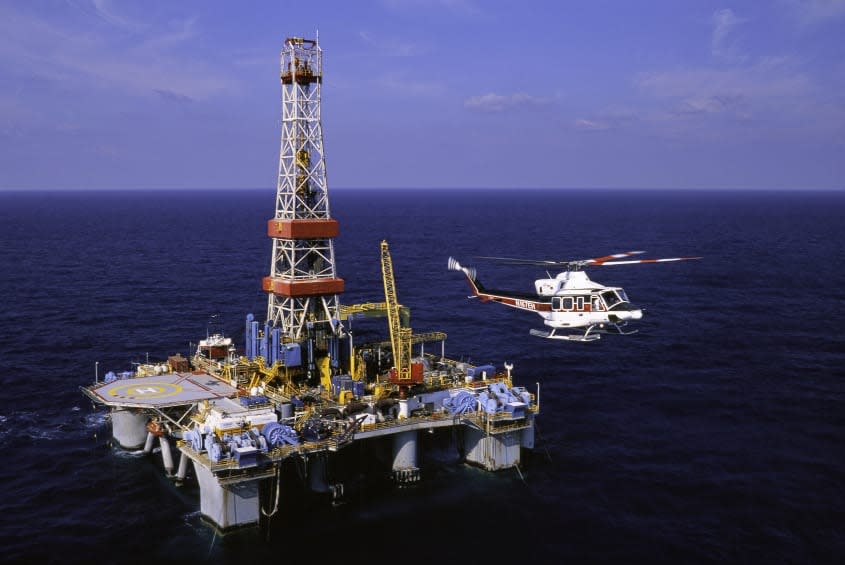Why did Biden auction off the Gulf of Mexico for oil drilling?

- Oops!Something went wrong.Please try again later.
The Biden administration has agreed to auction off oil and gas leases for over 73 million acres of federal water in the Gulf of Mexico. The decision comes just after President Biden approved the Willow Project in Alaska, oil company ConocoPhillips' multi-billion dollar oil drilling proposal. Why has the administration taken these steps? Here's everything you need to know:
Why was the auction approved?
During his campaign, Biden promised he would be "banning new oil and gas permitting on public lands and waters," NPR writes. However, this has not come to fruition during his presidency.
Despite the implications for climate change, the Gulf of Mexico auction was actually a stipulation of the 2022 Inflation Reduction Act (IRA) that arose as a compromise between Sen. Joe Manchin (D-W.Va.) and other Senate Democrats. The auction, called Lease Sale 259, was to be held "no later than March 30, 2023," and put up for sale an Italy-sized area for the purpose of oil drilling. Manchin's IRA requirements also called for the sale of land in the Cook Inlet of Alaska, according to CNN. That lease is likely to begin in September 2023.
Approval of the Gulf auction notably arrived after Biden also gave the go-ahead to the Willow Project, another large-scale oil drilling scheme that has garnered strong backlash. "My strong inclination was to disapprove of it across the board," Biden said of that initiative. "But the advice I got from counsel was that if that were the case, we may very well lose in court."
An environmental analysis by the Bureau of Ocean Energy Management (BOEM) found that the drilling from these leases could cause 21.2 million metric tons of carbon dioxide to be released into the atmosphere. The United Nations has warned against raising average global temperatures by 1.5 degrees Celsius over pre-industrial levels and has identified fossil fuels as the most significant factor in raising emissions. Further, the Gulf of Mexico already has active oil and gas drilling projects that are releasing much higher levels of greenhouse gases than previously thought, according to a newly-released study. This is largely due to methane pollution, which is 80 times more potent than carbon dioxide as a greenhouse gas. Current projects in the Gulf release 600,000 metric tons of methane per year. "The good news," however, "is that the bulk of emissions comes from one class of facilities, which means mitigation measures can be more targeted," Eric Kort, the report's co-author, told CNN.
What are oil companies saying about the auction?
Oil companies have bid close to $264 million to secure rights to drill in the Gulf area. The sale also acts as a "first test of demand for investment" since Russia invaded Ukraine, straining oil and gas resources all over the world, per Reuters.
The National Ocean Industries Association, an oil and gas industry group, called the sale "an opportunity to strengthen our national security interests and develop domestic energy supplies in the face of geopolitical uncertainty and tight global demand." The American Petroleum Institute (API) also celebrated the scheme, calling it "a belated but positive step toward a more energy-secure future," while simultaneously noting "it should not take an act of Congress to get us to this point."
Bids in the Gulf auction were also up 38 percent compared to the previous one, which took place in 2017, The Associated Press writes. Chevron USA was the highest bidder, with $108 million in high bids for 75 tracts. "Leases resulting from this sale will include stipulations to mitigate potential adverse effects on protected species and to avoid potential conflicts with other ocean uses in the region," BOEM says.
What are environmental groups saying about it?
Environmental groups have largely condemned the sale of the land.
"There's nothing in the IRA that required it to be so large," said George Torgun, an attorney for the group Earthjustice. "If it goes forward as planned, it's double the size of Willow. It's going to lock in fossil fuel development in the Gulf for the next 50 years." Woody Martin of the Sierra Club shared a similar sentiment to NPR, saying, "The sanctioning of huge fossil fuel extraction commits the U.S. to long-term fossil fuel dependency," adding that it will lead to "disastrous consequences and enormous costs for the U.S. and global economies."
"Expanding dirty energy will worsen the climate crisis and new leasing for offshore oil and gas drilling must stop," said Diane Hoskins, Campaign Director for the group Oceana. "President Biden may claim his hands were tied on this sale because of the IRA's mandate, but he still has the opportunity to make good on his promise to end new oil and gas leasing in his Five-Year Plan."
Some of the groups have also already filed a lawsuit against the Department of the Interior in an attempt to have the sales canceled. The auction is "out of step with what Biden himself has called the existential threat of climate change," Torgun noted.
Update April 4, 2023: This article was updated to include additional information on the environmental consequences of drilling projects.
You may also like
Scientists break record for fish filmed in deepest waters to date
Former Manhattan D.A. says federal prosecutors asked him to 'stand down' on Trump hush-money probe

